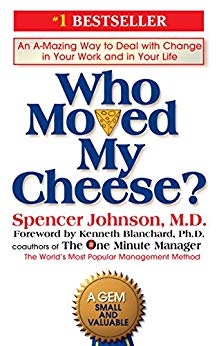

This article is an excerpt from the Shortform summary of "Who Moved My Cheese" by Spencer Johnson. Shortform has the world's best summaries of books you should be reading.
Like this article? Sign up for a free trial here .
We all experience change in our lives. It can be distressing or rewarding, depending on our approach. Who Moved My Cheese is a parable that demonstrates in practical terms how to handle change better and avoid pitfalls, by practicing a few key principles: anticipate and prepare for change, overcome fears, envision success, and enjoy change. By depicting simple, memorable characters and scenarios, the parable gives you a framework for responding to change successfully.
Learning to prepare for change comes at the beginning of the process of dealing with change, but it’s one of the most important steps. The better you can prepare for change, the easier the transition will be. Learn how this applies both at work and in life.
A Road Map for Preparing for Change
Who Moved My Cheese, a bestseller by Spencer Johnson published in 1998, is a parable about the inevitability of change, the ways in which we typically deal with it, and how revising our attitude toward change can reduce stress and increase success. Like all parables, it’s told as a story that you can relate clearly to your life. Before we discuss why we need to prepare for change, let’s look at the story.
The parable unfolds in a maze, where four characters — two mice (Sniff and Scurry) and two tiny humans (Hem and Haw), search for cheese, which represents happiness. They get pretty good at this. The mice use their simple, rodent-specific talents of sniffing out cheese and scurrying around until they find it. Hem and Haw use their human thinking and analytical skills to also find cheese. They find a huge supply and all four enjoy its benefits for quite a while.
One day the maze dwellers confront a crisis: The cheese is gone. All four characters must adapt in one way or another to their changed circumstances.
The mice are the best equipped at the outset because they have prepared for change.
- They’re not surprised at the change because they noticed it happening. They stayed observant and noticed that the cheese was getting old and the pile was shrinking.
- They’re ready to act because they’ve stayed alert and anticipated change.
- They act quickly to adapt – they immediately put on their running shoes, which they’ve kept at the ready, and set out to find new cheese.
- They’re persistent, eventually finding a new stockpile.
- Even with new cheese at hand, they monitor the situation and check around for new supplies because they know things will change again.
It’s from the mice that we learn the importance of preparing for change.
Prepare for Change to Better Adapt
Be prepared for change: Pay attention to signs of change in your environment, whether it’s layoffs at your workplace, new aches and pains, or strains in your home life. Consider how potential changes could affect you and develop a plan to handle them – for instance, by learning new skills. Thinking about the future helps you better prepare for change.
- In the story: Mice Sniff and Scurry noticed the cheese stockpile getting old and dwindling. They were ready (they kept their running shoes handy) to search for a new supply when the old one disappeared.
- At work, watch for change by paying attention to company statements, workload and structural changes, and industry trends. If you sniff out change, you can prepare for change by getting your personal finances in order, adding a part-time job, learning a new skill to develop your job in a different direction, or moving to a new company.
Let go of the past: When things do change, move forward quickly. The longer you wait, the more resistance you build to moving, and the harder it’ll be to adapt later. If you’ve prepared for change, letting go of the past will be easier.
- In the story: Sniff and Scurry were action-oriented, and set off immediately to search for new cheese. It helped that they also kept things simple and didn’t overanalyze or overcomplicate things by, for instance, getting hung up on “what if’s.” It also helped that they had been prepared for change.
- In the story: Initially, Haw also stayed with Hem and wished for things to return to normal. But Haw came to his senses and realized the world had changed, and he had to change with it. Later he concluded that adapting to change is easier the less you wait.
- Many people who finally muster the courage to leave a job or relationship that’s not working for them, often wonder in retrospect why they hadn’t made the change sooner.
Be prepared for continuous change: Change is a natural part of life. Change should only be a surprise if you aren’t paying attention, or if you’re operating on erroneous assumptions — for instance, that you’re entitled to having things a certain way. Pay attention to prepare for change.
- In the story: After finding the new cheese at the end of the book, Sniff and Scurry expected and prepared for even more change by continuing to explore new parts of the maze. Haw did the same thing, because he had learned from his mistakes and pledged not to be surprised by change again.
- Learn to enjoy change — it can offer rewards such as greater income, new relationships, or greater job satisfaction from using more of your talents. Finally, expect and prepare for continuous change by always growing and learning in your personal and professional life.
If we prepare for change, we can more quickly adapt when it happens.
———End of Preview———

Like what you just read? Read the rest of the world's best summary of "Who Moved My Cheese" at Shortform . Learn the book's critical concepts in 20 minutes or less .
Here's what you'll find in our full Who Moved My Cheese summary :
- The absolute worst thing to do when change is coming
- How to adapt to change, like the key characters
- How to handle change in work and life






